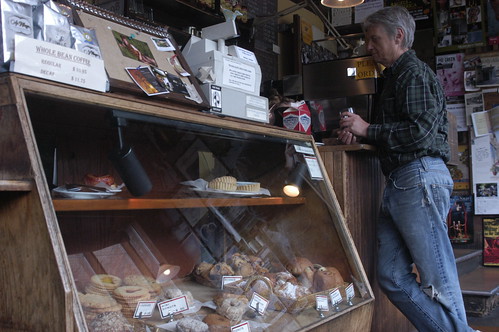 International trade disputes , famine, and droughts have brought food production to the forefront of global consciousness. Gas prices remain high, and senators continue to call for approval of off-shore drilling.
International trade disputes , famine, and droughts have brought food production to the forefront of global consciousness. Gas prices remain high, and senators continue to call for approval of off-shore drilling.These problems may seem far-flung, but local cafes and bakeries have noticed too. Wheat product and fuel prices are affecting business relations in surprising ways as local companies adjusts to the price increases.
The U-District's Cafe Allegro decided to change bagel suppliers when their original supplier — Noah's Bagels, a national chain — added a $15 delivery surcharge on top of earlier bagel hikes.
"It would have more than doubled the cost," says Chris Peterson, Allegro co-owner, explaining that they only order $12–$15 of bagels per order. "I think they just decided that wholesale bagel sales were not profitable."
A couple of weeks ago Bulldog News & Espresso, the tiny espresso stand operating out of Bulldog News on University Way, stopped buying bagels all together. Barista Arielle Kloss says there wasn't enough demand to keep buying their usual 10–15 bagels from the Seattle Bagel Deli.
"It's hard, it's very hard," says Dennis Ballen, owner of Blazing Bagels in Redmond. "Gas is killing us." His business had to raise the price of their bagels in March, when wheat futures spiked and the cost of a 50-lb bag of flour nearly doubled to about $24. Ballen says his bakery has been able to deal with rising flour prices, but it's the gas that really worries him.
Fuel costs are pinching Blazing Bagels and other bakeries who distribute their own product as their wholesale distributors add or increase delivery surcharges. Ballen noticed one day that the surcharge for one delivery had jumped from $1.50 to $6 — an increase he says really builds up because he receives several shipments a week from several different suppliers.
Ballen has tried not to pass it on to his wholesale customers — he delivers anywhere in the Puget Sound area for $1.50 — but at this point, “The more companies that want to distribute my product, the better," he says.
"A lot of small bakeries go out of business because of the distribution. It can really hurt ya," observes James Morse, owner of Little Rae's, a bakery that distributes Blazing Bagels. Morse says when he tried to add a delivery fuel charge a few months ago, "people didn't really like it and accused us of being a part of OPEC."
Morse doesn't quite understand why Noah's increased their prices so much, explaining, “the bigger you are, the easier it is to keep your cost down.” He says smaller bakeries have to strategize to reduce costs.
“One thing we have a good system for, is we do our deliveries in the middle of the night. We get to move freely throughout the night,” Morse reveals, which serves the double purpose of avoiding traffic and getting bagels there early in the morning. Blazing Bagels delivers then too, from 1am-7am in the morning.
Not all of Noah's customers have switched, however. The owner of Cafe on the Ave, Song, who did not give his last name, says that he debated changing vendors a few months ago after a 10–15 cent price increase per bagel, but in the end decided not to.
"I'd rather carry Noah's because their quality is better," Song explains. He accepts the delivery surcharge too, pointing out that other distributors just incorporate the cost of fuel into their product prices, instead of keeping it separate.
Song says that he and other cafe owners are trying hard not to pass the buck on to their customers, but at some point they'll have to.
“Historically, we have never had to [make] two price increases in a year,” says Anna Li, Director of Sales and Marketing for Essential Baking, which bakes pastries and distributes for Bagel Oasis. Essential is particularly vulnerable to price hikes because of their commitment to organic flour and biodiesel, which are at least 50 percent more expensive than regular flour and gas.
Li sees both businesses and individuals adapting to increasing costs, and that means finding ways to work smarter, not just pass the hikes down the line.
"I think honestly, it’s just an adjustment,” Li contends. “Americans are very lucky to spend so little on their food.”



No comments:
Post a Comment